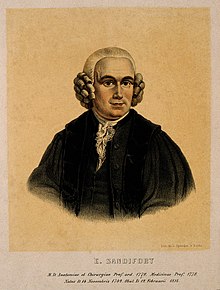| Eduard Sandifort | |
|---|---|
 Portrait. Credit: Wellcome Library Portrait. Credit: Wellcome Library | |
| Born | (1742-11-14)14 November 1742 Dordrecht |
| Died | 12 February 1814(1814-02-12) (aged 71) Leiden |
| Nationality | Dutch |
| Alma mater | Leiden University |
| Spouse |
Catharina Johanna Kinkeed
(m. 1775) |
| Scientific career | |
| Fields | Anatomy Surgery |
| Institutions | Leiden University |
| Thesis | Dissertatio anatomico-obstretica de pelvi, ejusque in partu dilatatione (1763) |
Eduard Sandifort (November 14, 1742 – February 12, 1814) was a Dutch physician and anatomist. He received his medical doctorate degree (Ph.D.) from Leiden University in 1763, and worked as a general practitioner in The Hague. He was fluent in Dutch, German, Swedish, and Italian. He became a professor of anatomy and surgery in 1771 at Leiden University. His most important writings are Observationes Anatomico-pathologicæ (1778), Excercitationes anatomicoacademicæ (1783–85), and the Museum Anatomicum Academiae Lugduno-Batavæ (1789–93), which was finished by his son, Gerard Sandifort (1779–1848). Sandifort translated Nils Rosén von Rosenstein's Underrättelser om barn-sjukdomar och deras botemedel (The diseases of children, and their remedies) to Dutch in 1768. Sandifort was elected in 1768 as a foreign member of the Swedish Royal Academy of Sciences in Stockholm. In 1779 he was the first to document a case of carpal coalition.
References
- The Global History of Paleopathology: Pioneers and Prospects - Google Books
- Laub, Donald R. Jr. (2014). Congenital Anomalies of the Upper Extremity: Etiology and Management. Springer. p. 219. ISBN 9781489975041. Retrieved 26 January 2018.
This biographical article about a Dutch academic is a stub. You can help Misplaced Pages by expanding it. |
This article about a Dutch scientist is a stub. You can help Misplaced Pages by expanding it. |